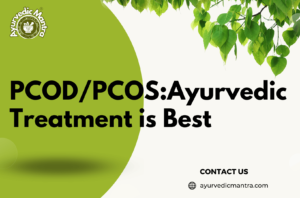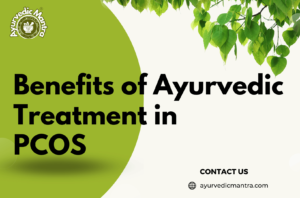
PCOD/PCOS: Ayurvedic Treatment is Best
Introduction Polycystic Ovary Disorder (PCOD) or Polycystic Ovary Syndrome (PCOS) is a common endocrine disorder affecting millions of women worldwide. It leads to hormonal imbalances,


Thyroid disease is a topic that has garnered much attention in recent years thanks to increased awareness and a growing interest in personal health. However, with the wealth of information available on the internet, it’s important to separate fact from fiction. In this article, we’ll debunk 15 common thyroid disease myths to provide accurate and reliable information.
Fact: While it’s true that thyroid disorders are more common in women, men can also develop thyroid issues. The prevalence might be higher in women, but men should not ignore the possibility of thyroid disease.
Fact: Thyroid issues can sometimes be challenging to diagnose. The symptoms can be vague and overlap with other conditions. Consulting a medical professional and undergoing appropriate tests is crucial for an accurate diagnosis.
Fact: While weight gain can be a symptom of hypothyroidism, an underactive thyroid, not all thyroid problems lead to weight gain. Hyperthyroidism, an overactive thyroid, can result in weight loss.
Fact: While there is a genetic component to thyroid disorders, lifestyle, and environmental factors also play a significant role. Poor diet, stress, and exposure to certain toxins can contribute to thyroid problems.
Fact: Hypothyroidism is not an inevitable part of aging. While the risk of thyroid issues may increase with age, hypothyroidism is a medical condition that should be evaluated and treated.
Fact: Thyroid medication helps manage the symptoms of thyroid disease, but it does not cure the underlying cause. It’s important to work with a healthcare provider to address the root of the problem.
Fact: Even mild thyroid dysfunction should be addressed. Subtle symptoms can impact your quality of life and escalate over time if left untreated.
Fact: Iodized salt can help prevent iodine deficiency, a common cause of hypothyroidism. However, other factors can contribute to thyroid issues, and iodized salt may not prevent all thyroid disorders.
Fact: Lifestyle choices can significantly impact thyroid health. A balanced diet rich in nutrients like selenium and zinc, stress management, and regular exercise can all contribute to a healthy thyroid.
Fact: Thyroid medication is prescribed for a reason and should not be replaced with supplements without medical guidance. Some supplements can interact with thyroid medication or worsen thyroid function.
Fact: While symptoms like fatigue, weight changes, and hair loss can be signs of thyroid issues, not everyone with thyroid disease experiences noticeable symptoms. Regular check-ups and thyroid function tests are important for early detection.
Fact: Stopping thyroid medication without consulting a doctor can have serious consequences. It’s important to follow medical advice and continue treatment as recommended.
Fact: Most thyroid nodules are benign, not cancerous. However, a healthcare professional should evaluate any unusual growth to rule out the possibility of cancer.
Fact: While TSH testing is important, a comprehensive thyroid panel, including T3, T4, and thyroid antibodies, provides a more accurate picture of thyroid function.
Fact: Some thyroid issues, such as inflammation or temporary imbalances, can be reversible. Proper treatment and lifestyle changes can sometimes restore thyroid function.
Understanding the truth behind these common thyroid myths is essential for maintaining good health. If you suspect a thyroid issue or have been diagnosed, working closely with a healthcare professional to develop a personalized treatment plan that addresses your unique needs is important. Remember, accurate information is the key to making informed decisions about your well-being.
Thyroid disease refers to a range of conditions that affect the thyroid gland, a small butterfly-shaped gland in the neck. These conditions can disrupt the normal production of thyroid hormones, leading to various health issues. The causes of thyroid disease can be multifactorial and include genetic factors, autoimmune disorders, iodine deficiency, certain medications, and lifestyle factors such as stress and poor diet.
The symptoms of thyroid disease can vary depending on whether the thyroid gland is overactive (hyperthyroidism) or underactive (hypothyroidism). Common symptoms of hyperthyroidism include rapid heartbeat, weight loss, anxiety, and tremors. Hypothyroidism, however, may lead to fatigue, weight gain, depression, and cold sensitivity. Other symptoms can include hair loss, changes in skin texture, and menstrual irregularities.
Thyroid disease is typically diagnosed through medical history, physical examination, and laboratory tests. Blood tests, such as thyroid-stimulating hormone (TSH), T3, and T4 levels, help assess thyroid function. Imaging tests like ultrasound and thyroid scans can provide additional information about the size and structure of the thyroid gland. Sometimes, a fine-needle aspiration biopsy may be performed to evaluate thyroid nodules for cancer.
Yes, thyroid dysfunction can impact fertility and pregnancy. Both hypothyroidism and hyperthyroidism have been associated with menstrual irregularities and difficulties in conceiving. During pregnancy, thyroid hormones play a crucial role in developing the baby’s brain and nervous system. Untreated thyroid disease during pregnancy can lead to complications such as preterm birth, preeclampsia, and developmental issues in the baby.
Treating thyroid disease depends on the specific condition and its underlying cause. Hypothyroidism is often treated with synthetic thyroid hormone medication to replace the deficient hormones. Hyperthyroidism may be managed with medications to reduce hormone production or through procedures like radioactive iodine therapy or surgery. Thyroid cancer may require surgical thyroid gland removal and may be followed by radioactive iodine treatment.
While there is no substitute for medical treatment, certain lifestyle changes can support thyroid health. Eating a balanced diet rich in iodine, selenium, and zinc is important. Managing stress through relaxation techniques, exercise, and adequate sleep can also positively impact thyroid function. However, natural remedies should be discussed with a healthcare professional and should not replace prescribed medications.
While some thyroid disorders have a genetic component, adopting a healthy lifestyle can reduce the risk of developing thyroid issues. Ensuring adequate intake of iodine through diet or supplementation can prevent iodine deficiency-related thyroid problems. Avoiding exposure to environmental toxins, managing stress, and maintaining a healthy weight are all steps that can contribute to thyroid health.
For many individuals, thyroid disease is a lifelong condition that requires ongoing management. Hypothyroidism often requires lifelong medication to maintain optimal hormone levels. In some cases, thyroid function may improve with appropriate treatment and lifestyle changes. Regular monitoring and follow-up with a healthcare provider are essential to ensure thyroid function remains stable.
Children and adolescents can develop thyroid disease, although it is less common than adults. Pediatric thyroid disorders can affect growth and development if left untreated. Conditions such as congenital hypothyroidism and Graves’ disease can impact young individuals. Timely diagnosis and treatment are crucial to prevent complications and support normal growth and development.
If you suspect you have thyroid issues, having an open and thorough discussion with your healthcare provider is important. Be prepared to discuss your symptoms, medical history, and any family history of thyroid disease. Your doctor may recommend blood tests to assess thyroid function and refer you to an endocrinologist, a specialist in hormone-related disorders, for further evaluation and treatment options.

Introduction Polycystic Ovary Disorder (PCOD) or Polycystic Ovary Syndrome (PCOS) is a common endocrine disorder affecting millions of women worldwide. It leads to hormonal imbalances,

Introduction Losing weight is a journey that requires dedication, consistency, and self-care. While there are numerous weight loss techniques out there, not all of them

Polycystic Ovary Syndrome (PCOS) is a hormonal disorder that affects millions of women worldwide. It can lead to various health complications, such as irregular periods,

In recent years, Ayurveda, an ancient system of natural healing originating from India, has gained significant popularity as an alternative approach to treating various health

आजकल वजन बढ़ने और चर्बी की वृद्धि होने की समस्या एक आम समस्या बन गई है। बढ़ते वजन और अतिरिक्त चर्बी के कारण न केवल

प्रस्तावना: आजकल वजन बढ़ने और ओबेसिटी की समस्या एक आम समस्या बन गई है। बढ़ते वजन के कारण न केवल शारीरिक समस्याएं होती हैं, बल्कि
